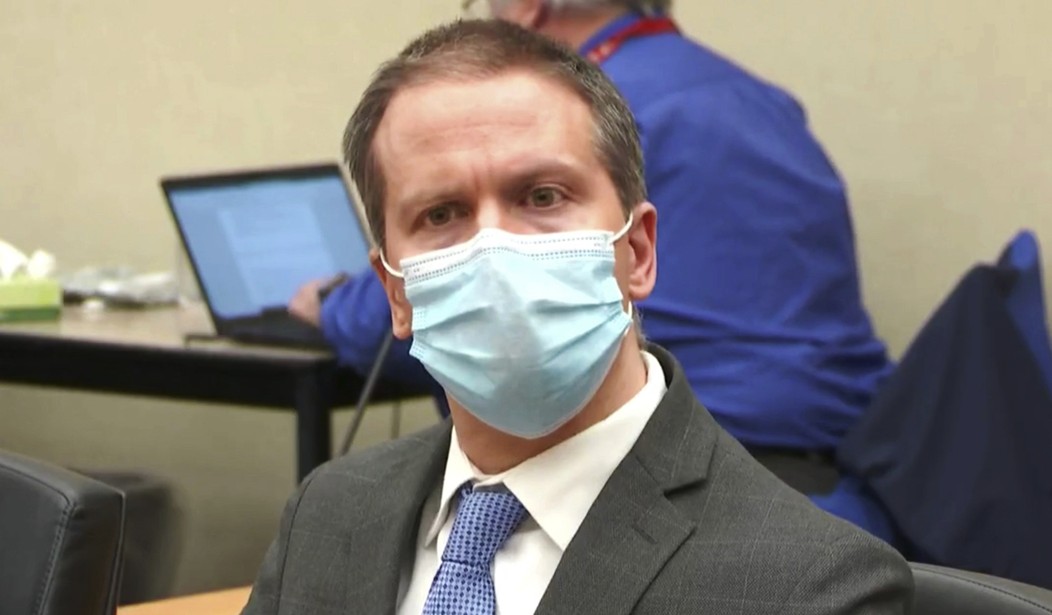If we played the Movie Pitch game, we’d call this Groundhog Day meets Flap. The Twin Cities might end up with at least two more trials over the death of George Floyd at the hands of police officers. The Star Tribune’s Andy Mannix reported yesterday that the Department of Justice plans to ask a grand jury to indict all four officers involved on federal civil-rights violations, including the just-convicted Derek Chauvin:
Now, with Chauvin’s state trial out of the way, federal prosecutors are moving forward with their case. They plan to ask a grand jury to indict Chauvin and the other three ex-officers involved in George Floyd’s killing — J. Alexander Kueng, Thomas Lane and Tou Thao — on charges of civil rights violations, a source said.
If the grand jury voted to indict, the former officers would face the new civil rights charges on top of the state’s cases, meaning all four could be headed toward yet another criminal trial in federal court.
In fact, Mannix reported that the DoJ had a plan to arrest Chauvin on such charges if the jury had acquitted him last week:
Leading up to Derek Chauvin’s murder trial, Justice Department officials had spent months gathering evidence to indict the ex-Minneapolis police officer on federal police brutality charges, but they feared the publicity frenzy could disrupt the state’s case.
So they came up with a contingency plan: If Chauvin were found not guilty on all counts or the case ended in a mistrial, they would arrest him at the courthouse, according to sources familiar with the planning discussions. …
Under the contingency arrest plan, the Minnesota U.S. Attorney’s Office would have charged Chauvin by criminal complaint — a quicker alternative for a federal charge that doesn’t require a grand jury — so they could arrest him immediately, and then asked a grand jury for an indictment, according to sources, who were not authorized to speak publicly.
If the jury had acquitted him, Chauvin might not have objected to being taken into custody rather than walking out of the courthouse on his own.
Just to make clear, this is not a double-jeopardy issue; that only applies to a single sovereign. People can be tried at both the state and federal levels on the basis of the same incident, usually for violations of different laws. However, his conviction for second-degree murder prompts another question: what’s the point of a second trial on civil-rights charges? Chauvin’s likely to get a sentence in the 12-15 year range, although the judge can go up to 40 years on the second-degree murder charge. State prosecutors will argue for an “upward departure” on the basis that Chauvin acted under color of authority as a police officer, a recommendation that all but duplicates any case that the DoJ would bring against Chauvin.
The maximum sentence for a federal civil-rights violation resulting in death could be life, depending on how the prosecutors argue the case. A first-time offender is likely to get a far lesser sentence, but that may be why they’re trying to charge Chauvin with two counts. According to Mannix, they’re asking the grand jury to deal with an earlier case that state prosecutors declined to prosecute, preferring to focus on Floyd. But that case didn’t involve a death, and even in this hothouse environment, that looks like a prosecutorial stretch that may not impress a judge.
Scott Johnson wonders why the DoJ is bothering after the state’s big win, apart from the politics. He also wonders whether this will create problems for the next trial already scheduled:
I assume that Mannix’s source is affiliated with the Department of Justice, either the Office of the United States Attorney for Minnesota or the local office of the FBI. Mannix does not note that the leak violates Department of Justice policy, but it does. I assume that is the reason his identity is entirely kept from view in Mannix’s story. …
The case against the three other officers is set for trial in August. Their prospects do not look great. The leak to Mannix can only prejudice their case.
I’d add another question: what’s the rush? The DoJ could have stayed out of this until after the second trial for the other three defendants. There was no pressing need to get a federal grand jury empaneled before then. The evidence and testimony might have been stronger after the trials, in fact. By doing this and now leaking it to the press, its impact on the second jury pool is a serious issue, especially in a county as fired up over this case as Hennepin and its surrounding communities.
It’s clear that the DoJ isn’t just backstopping against a failed state prosecution as everyone expected, but trying to score points on its own. That’s the “why,” and it’s not going to be cost-free. Another set of trials will keep the pot boiling in the Twin Cities for months or years to come, rather than the opportunity for some closure after the second trial of the other three officers in August. It looks like as much of a stunt as an arrest of Chauvin in the courtroom would have been. To the extent that it sets up a potential fair-trial issue for the other three defendants by further tainting the jury pool, it could be a very destructive stunt, in more than one way.








Join the conversation as a VIP Member